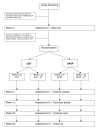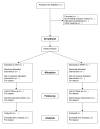Cognitive Behavioral Therapy versus Short Psychodynamic Supportive Psychotherapy in the outpatient treatment of depression: a randomized controlled trial
- PMID: 17963493
- PMCID: PMC2174932
- DOI: 10.1186/1471-244X-7-58
Cognitive Behavioral Therapy versus Short Psychodynamic Supportive Psychotherapy in the outpatient treatment of depression: a randomized controlled trial
Abstract
Background: Previous research has shown that Short Psychodynamic Supportive Psychotherapy (SPSP) is an effective alternative to pharmacotherapy and combined treatment (SPSP and pharmacotherapy) in the treatment of depressed outpatients. The question remains, however, how Short Psychodynamic Supportive Psychotherapy compares with other established psychotherapy methods. The present study compares Short Psychodynamic Supportive Psychotherapy to the evidence-based Cognitive Behavioral Therapy in terms of acceptability, feasibility, and efficacy in the outpatient treatment of depression. Moreover, this study aims to identify clinical predictors that can distinguish patients who may benefit from either of these treatments in particular. This article outlines the study protocol. The results of the study, which is being currently carried out, will be presented as soon as they are available.
Methods/design: Adult outpatients with a main diagnosis of major depressive disorder or depressive disorder not otherwise specified according to DSM-IV criteria and mild to severe depressive symptoms (Hamilton Depression Rating Scale score > or = 14) are randomly allocated to Short Psychodynamic Supportive Psychotherapy or Cognitive Behavioral Therapy. Both treatments are individual psychotherapies consisting of 16 sessions within 22 weeks. Assessments take place at baseline (week 0), during the treatment period (week 5 and 10) and at treatment termination (week 22). In addition, a follow-up assessment takes place one year after treatment start (week 52). Primary outcome measures are the number of patients refusing treatment (acceptability); the number of patients terminating treatment prematurely (feasibility); and the severity of depressive symptoms (efficacy) according to an independent rater, the clinician and the patient. Secondary outcome measures include general psychopathology, general psychotherapy outcome, pain, health-related quality of life, and cost-effectiveness. Clinical predictors of treatment outcome include demographic variables, psychiatric symptoms, cognitive and psychological patient characteristics and the quality of the therapeutic relationship.
Discussion: This study evaluates Short Psychodynamic Supportive Psychotherapy as a treatment for depressed outpatients by comparing it to the established evidence-based treatment Cognitive Behavioral Therapy. Specific strengths of this study include its strong external validity and the clinical relevance of its research aims. Limitations of the study are discussed.
Trial registration: Current Controlled Trails ISRCTN31263312.
Figures
References
-
- World Health Organization . The World Health Report 2001: Mental Health: new understanding, new hope. Geneva; 2001. http://www.who.int/whr/2001/en/index.html
-
- World Health Organization . The World Health Report 2003: Shaping the future. Geneva; 2003. http://www.who.int/whr/2003/en/index.html
-
- Roth A, Fonagy P. Depression. In: Roth A and Fonagy P, editor. What works for whom: A critical review of psychotherapy research. 2nd. Vol. 4. New York, The Guilford Press; 2005. pp. 66–134.
-
- Abbass AA, Hancock JT, Henderson J, Kisely S. Short-term psychodynamic psychotherapies for common mental disorders. Cochrane Database Syst Rev. 2006;4:CD004687. - PubMed
-
- de Jonghe F, Rijnierse P, Janssen R. Psychoanalytic supportive psychotherapy. J Am Psychoanal Assoc. 1994;42:421–446. - PubMed
Publication types
MeSH terms
Associated data
LinkOut - more resources
Full Text Sources



